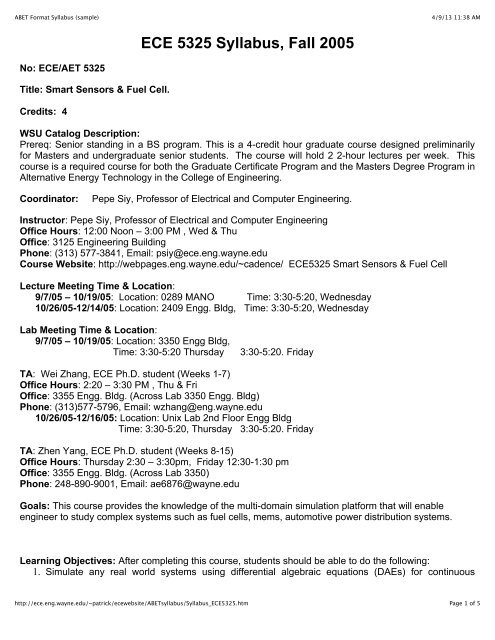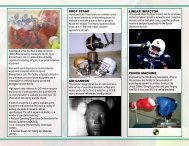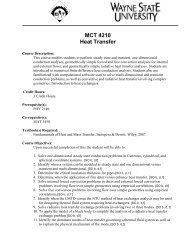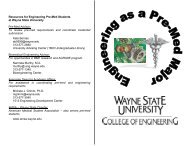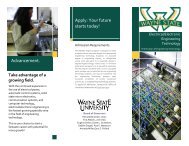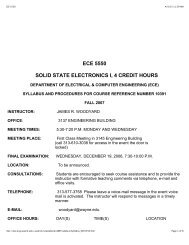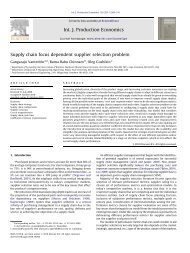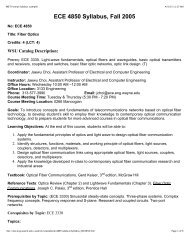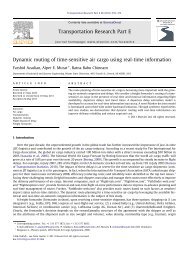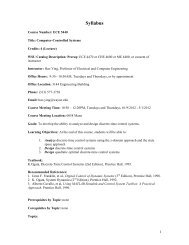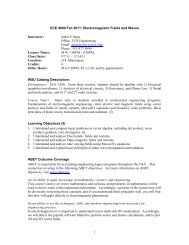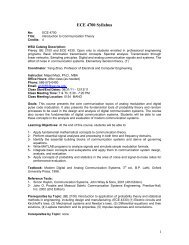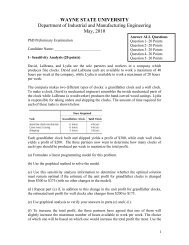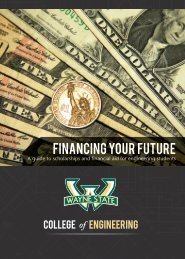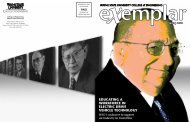ABET Format Syllabus for ECE 5325 - College of Engineering
ABET Format Syllabus for ECE 5325 - College of Engineering
ABET Format Syllabus for ECE 5325 - College of Engineering
- No tags were found...
Create successful ePaper yourself
Turn your PDF publications into a flip-book with our unique Google optimized e-Paper software.
<strong>ABET</strong> <strong>Format</strong> <strong>Syllabus</strong> (sample)4/9/13 11:38 AM<strong>ECE</strong> <strong>5325</strong> <strong>Syllabus</strong>, Fall 2005No: <strong>ECE</strong>/AET <strong>5325</strong>Title: Smart Sensors & Fuel Cell.Credits: 4WSU Catalog Description:Prereq: Senior standing in a BS program. This is a 4-credit hour graduate course designed preliminarily<strong>for</strong> Masters and undergraduate senior students. The course will hold 2 2-hour lectures per week. Thiscourse is a required course <strong>for</strong> both the Graduate Certificate Program and the Masters Degree Program inAlternative Energy Technology in the <strong>College</strong> <strong>of</strong> <strong>Engineering</strong>.Coordinator:Pepe Siy, Pr<strong>of</strong>essor <strong>of</strong> Electrical and Computer <strong>Engineering</strong>.Instructor: Pepe Siy, Pr<strong>of</strong>essor <strong>of</strong> Electrical and Computer <strong>Engineering</strong>Office Hours: 12:00 Noon – 3:00 PM , Wed & ThuOffice: 3125 <strong>Engineering</strong> BuildingPhone: (313) 577-3841, Email: psiy@ece.eng.wayne.eduCourse Website: http://webpages.eng.wayne.edu/~cadence/ <strong>ECE</strong><strong>5325</strong> Smart Sensors & Fuel CellLecture Meeting Time & Location:9/7/05 – 10/19/05: Location: 0289 MANO Time: 3:30-5:20, Wednesday10/26/05-12/14/05: Location: 2409 Engg. Bldg, Time: 3:30-5:20, WednesdayLab Meeting Time & Location:9/7/05 – 10/19/05: Location: 3350 Engg Bldg,Time: 3:30-5:20 Thursday3:30-5:20. FridayTA: Wei Zhang, <strong>ECE</strong> Ph.D. student (Weeks 1-7)Office Hours: 2:20 – 3:30 PM , Thu & FriOffice: 3355 Engg. Bldg. (Across Lab 3350 Engg. Bldg)Phone: (313)577-5796, Email: wzhang@eng.wayne.edu10/26/05-12/16/05: Location: Unix Lab 2nd Floor Engg BldgTime: 3:30-5:20, Thursday 3:30-5:20. FridayTA: Zhen Yang, <strong>ECE</strong> Ph.D. student (Weeks 8-15)Office Hours: Thursday 2:30 – 3:30pm, Friday 12:30-1:30 pmOffice: 3355 Engg. Bldg. (Across Lab 3350)Phone: 248-890-9001, Email: ae6876@wayne.eduGoals: This course provides the knowledge <strong>of</strong> the multi-domain simulation plat<strong>for</strong>m that will enableengineer to study complex systems such as fuel cells, mems, automotive power distribution systems.Learning Objectives: After completing this course, students should be able to do the following:1. Simulate any real world systems using differential algebraic equations (DAEs) <strong>for</strong> continuoushttp://ece.eng.wayne.edu/~patrick/ecewebsite/<strong>ABET</strong>syllabus/<strong>Syllabus</strong>_<strong>ECE</strong><strong>5325</strong>.htmPage 1 <strong>of</strong> 5
<strong>ABET</strong> <strong>Format</strong> <strong>Syllabus</strong> (sample)4/9/13 11:38 AM8 15 Electronics Interfacing overview (Ch 9); SCMOS technology designrule (Ch10)16 Schematic Capture Using Virtuoso Schematic Editor(VSE) (Lab 7),Functional Simulation Using Affirma Analog Simulator (Lab 8)9 17 Transistor, resistor, and capacitor standard cell layout (Ch11)18 Layout Using Virtuoso Layout XL (Lab 9)10 19 Transmission Gate and Digital Circuit Design (Ch12)20 IC Extraction and Post Layout Simulation (Lab 10)11 21 Current Source/Sink & Biasing Principle (Ch13)22 Hierarchical Design (Lab 11)12 23 Common Source Amplifier (Ch14)24 Complete Layout with Padframe (Lab 12)13 25 CMOS Inverter (Ch15)26 GroupLab Announcement (No Lab)14 27 Common Gate and Cascode Amplifier (Ch16)28 Open Lab <strong>for</strong> Project Completion; Individual Project Announcement15 29 Common Drain /Source Follower (Ch 17)30 Open Lab <strong>for</strong> Project CompletionAssessment Methods:Homework and Assignments –· Reading assignments from course handouts and materials from internet pages.Laboratory Components-· 12 lab sessions (20%)· Lab must be completed on the week assigned. Late lab is penalized @ 10%per day excludingweekend.Course Projects and Open Ended Problems –· Lab project (20%)Examinations-· One midterm(30%), Take home final (30%)Grading Scale:A A- B+ B B- C+ C F>=95 >=90 >=85 >=80 >=75 >=70 >=65
<strong>ABET</strong> <strong>Format</strong> <strong>Syllabus</strong> (sample)4/9/13 11:38 AMthe instructor and your classmates. In order to do this, you should read the papers given to you prior toattending class. This will include handouts and reference lists or review articles as well as the paperswritten by your classmates.Withdrawal Policy The last day to drop any class with a tuition refund is the end <strong>of</strong> the second week <strong>of</strong>classes. The last day to withdraw from the class, without a notation <strong>of</strong> W on the transcript, is the end <strong>of</strong>the fourth week <strong>of</strong> classes. All drop/add activity during the first 4 weeks should be done through Pipeline.Between the end <strong>of</strong> the fourth and fifth weeks, withdrawals require the permission <strong>of</strong> the instructor andmust be submitted on a Drop/Add <strong>for</strong>m to the Registrar’s Office.It is the policy <strong>of</strong> the <strong>College</strong> <strong>of</strong> <strong>Engineering</strong> not to allow withdrawals from courses after the end <strong>of</strong> the 5thweek except under exceptional circumstances. Failing a class is not an acceptable excuse <strong>for</strong> withdrawalafter the 5th week. Withdrawals after this time require the permission <strong>of</strong> the Associate Dean <strong>for</strong> AcademicAffairs.Policy on Cheating: It is the policy <strong>of</strong> the Electrical and Computer Program that any instance <strong>of</strong> cheatingwill result in a grade <strong>of</strong> F <strong>for</strong> the course. Cheating is defined by the University as “intentionally using orattempting to use, or intentionally providing or attempting to provide, unauthorized materials, in<strong>for</strong>mation,or assistance in any academic exercise.” This includes any group ef<strong>for</strong>ts on assignments or examsunless specifically approved by the pr<strong>of</strong>essor <strong>for</strong> that assignment/exam. Evidence <strong>of</strong> fabrication orplagiarism, as defined by the University in its brochure Academic Integrity, will also result in downgrading<strong>for</strong> the course. Please refer to the “Expectations <strong>for</strong> Citation in Biomedical <strong>Engineering</strong>” handout (attachedand available on the web) and to the Departmental recommended book on scientific writing, <strong>for</strong> guidance.STUDENTS WHO CHEAT ON ANY ASSIGNMENT OR DURING ANY EXAMINATION WILL BEASSIGNED A FAILING GRADE FOR THE COURSE.There<strong>for</strong>e avoid all appearance <strong>of</strong> improper behavior! Students who witness cheating should report theincident to the instructor as soon as possible. Students are also welcome to discuss any concerns relatedto cheating with the instructor.“Academic dishonesty ... tends to compromise the academic integrity <strong>of</strong> the institution or subvert theeducation process. All <strong>for</strong>ms <strong>of</strong> academic dishonesty are prohibited at Wayne State University, asoutlined in the Student Due Process Policy.” -- from Academic Integrity: Important In<strong>for</strong>mation <strong>for</strong> Facultyand StudentsOutcome Coverage:(a) An ability to apply knowledge <strong>of</strong> mathematics, science, and engineering. The laboratory exercisesand exams require knowledge <strong>of</strong> mathematics, science, and engineering to successfully completethe course.(b) An ability to design and conduct experiments, as well as to analyze and interpret data. Studentsare presented with large-scale simulation problems. The student must design the experiments sothat it can be simulated within the constraint <strong>of</strong> the student version s<strong>of</strong>tware package. In addition,students must analyze the results <strong>for</strong> accuracy.(c) An ability to design a system, component, or process to meet desired needs within realisticconstraints such as economic, environmental, social, political, ethical, health and safety,manufacturability, and sustainability. Students learn the process <strong>of</strong> VLSI chip fabrication throughMOSIS. The chip are designed to achieve a design specifications.(d) An ability to function on multi-disciplinary teams. Students learn multi-domains simulation andmodeling using VHDL-AMS. Students work in muti-disciplinary type projects.(e) An ability to identify, <strong>for</strong>mulate, and solve engineering problems. Students are presented withhttp://ece.eng.wayne.edu/~patrick/ecewebsite/<strong>ABET</strong>syllabus/<strong>Syllabus</strong>_<strong>ECE</strong><strong>5325</strong>.htmPage 4 <strong>of</strong> 5
<strong>ABET</strong> <strong>Format</strong> <strong>Syllabus</strong> (sample)4/9/13 11:38 AMengineering problems, like MEMS accelerometer, which require the knowledge <strong>of</strong> how to convertmechanical acceleration to electrical signal <strong>for</strong> mesurement.(i) A recognition <strong>of</strong> the need <strong>for</strong>, and an ability to engage in life-long learning. Students are exposedto multi-disciplinary type <strong>of</strong> projects requiring continuous and life-long learning. The students needto learn new discipline to conduct and complete projects.(k) An ability to use the techniques, skills, and modern engineering tools necessary <strong>for</strong> engineeringpractice. Students learn the skills in creating VLSI layout using state <strong>of</strong> the art CAD tools(CADENCE s<strong>of</strong>tware package), learned multi-domain simulation using VHDL-AMS <strong>for</strong> conductingresearch in multi-disciplinary project, like sensors in biomedical applications. Learned electroniccircuits simulation using SPICE.Prepared By: Pepe Siy, Pr<strong>of</strong>essor <strong>of</strong> Electrical and Computer <strong>Engineering</strong>Last Revised: September 14, 2005http://ece.eng.wayne.edu/~patrick/ecewebsite/<strong>ABET</strong>syllabus/<strong>Syllabus</strong>_<strong>ECE</strong><strong>5325</strong>.htmPage 5 <strong>of</strong> 5


